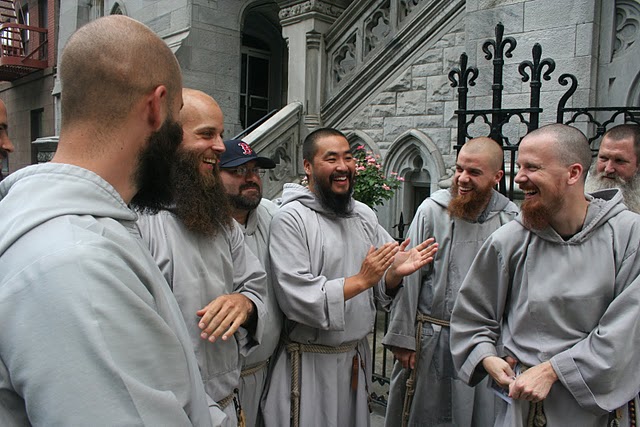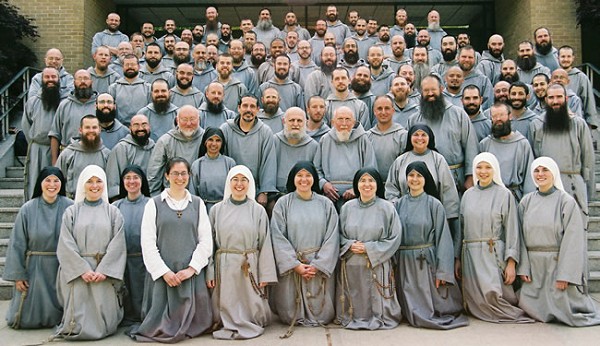Eunuchs for the Kingdom?
 Yesterday, I had a conversation on Facebook about a passage concerning the “eunuchs” in Matthew’s Gospel:
Yesterday, I had a conversation on Facebook about a passage concerning the “eunuchs” in Matthew’s Gospel:
10 The disciples said to him [in response], “If such is the case of a man with his wife, it is not expedient to marry.”
11 But [Jesus] said to them, “Not all men can receive this precept, but only those to whom it is given. 12 For there are eunuchs who have been so from birth, and there are eunuchs who have been made eunuchs by men, and there are eunuchs who have made themselves eunuchs for the sake of the kingdom of heaven. He who is able to receive this, let him receive it.”
– Matthew 19:10-12
What does this text mean? Here’s a five minute explanation…
How to make a eunuch…
The Lord’s words about “eunuchs” follow hot on the heels of His teaching about the permanence of marriage (Matthew 19:1-10). In response to this, the disciples are shocked, much in the same way as most people are today. The Apostles suggest that, if you can’t get rid of your wife, then perhaps it’s best not to marry at all!
Using their response as a launchpad, Jesus then begins to speak about “eunuchs”. In just a few verses, He identifies three kinds of eunuchs:
1. Those who have “been so from birth”
This refers to those born with a physical deformity.
2. Those who have “been made eunuchs by men”
The second category of euchuch refers to those who have been castrated some time after their birth.
Castration was something of a common practice in the ancient world. It was typically performed on those who served in the royal court. Due to their proximity to the king’s queens and concubines, it was done to ensure that no child was born who was not sired by the king himself.
3. Those who “made themselves eunuchs for the sake of the kingdom of heaven”
This group of people have undergone no physical operation. Instead, they have received a spiritual calling. This group refers to those who, for the sake of the Kingdom of Heaven, have given up the good of marriage and conjugal love, sacrificing it in favour of service in the Kingdom.
St. Paul exhorts the Corinthians to this in his first letter to that congregation (1 Corinthians 7:5-9, 32-34).

It is interesting to note that, despite the exhortation to celibacy found in the New Testament, it’s something of a rarity among Sola Scriptura Christians.
But why would you do this?
From Scripture I see two main reasons presented in favour of lifelong celibacy:
1. Devoted Service
In his exhortation mentioned above to the Corinthians, St. Paul says that “The unmarried man is anxious about the affairs of the Lord, how to please the Lord; but the married man is anxious about worldly affairs, how to please his wife, and his interests are divided”. Therefore, we see that a man who does not have the cares of natural family life can devote himself more directly to ministry.
2. Eschatological sign
Celibacy is an eschatological sign, that is, it points to Heaven.
Later in Matthew’s Gospel, in His encounter with the Sadducees, Jesus says that “in the resurrection [people] neither marry nor are given in marriage, but are like angels in heaven” (Matthew 22:30). Why will there no longer be marriage in Heaven? There are several things that we could say here, but I think the important point for us today is that the sign which marriage signifies will have reached its completion.
I live in La Mesa and work in San Diego. As I travel into work, the signs to San Diego, which I initially see, eventually cease. There are no signs to San Diego once I arrive in San Diego. A sign to San Diego would serve no purpose as I have arrived at my destination – the sign has given way to the reality.
So what sign does Marriage signify? The sacrament of matrimony shows the relationship between Christ and His Church (Ephesians 5:25-33) and presents us with a picture of the inner life of the Trinity. Given this understanding, we can see why there is no longer marriage in Heaven. We we have arrived home and earthly signs give way to heavenly realities.
It is for both of these reasons that celibates have been so important to the life of the Church since the very beginning. Monks and nuns have offered dedicated service to the Lord. They have given up natural family life in favour of supernatural family life. They have given up the generation of natural children in favour of the generation children supernaturally.
Celibacy has always offered a striking sign of contradiction. In a world that praises money, sex and power, those who have chosen to be “eunuchs for the sake of the kingdom” present a stark witness, choosing instead to take vows of poverty, chastity and obedience.

Great article, DB. Blessings to you in 2014!
Thanks
Pingback: This Week's Best in Catholic Apologetics | DavidLGray.INFO